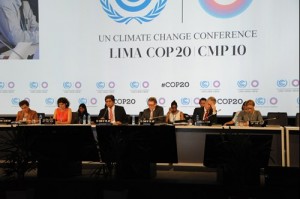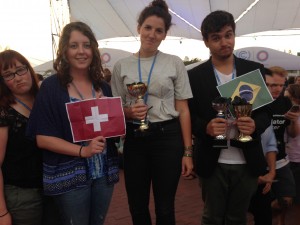Jennifer M. Klein, Esq., Associate Director & Fellow
Meredith Wilensky, Esq., 2013-2014 Associate Director & Fellow

On Day 3 of COP20, the ADP continued detailed discussions of the draft negotiating text in breakout sessions. The morning sessions addressed portions of the text by topic, including adaptation and finance. Tensions built in the afternoon session surrounding disagreement over the negotiation process.
A few themes emerged in the ADP session focused on adaptation. Discussions highlighted questions about how much reporting and international review is appropriate to monitor adaptation efforts. Parties also discussed the text’s inclusion of a long-term adaptation goal, with many challenging the goal’s link to a temperature limit. Many parties weighed in on whether loss and damage should be included under adaptation or addressed as a separate component of a 2015 agreement. A number of issues also arose with respect to developing countries, including concerns about the burdens of additional obligations and the lack of differentiation between developed and developing nations in the draft text.
In the afternoon, the ADP reconvened to discuss the first section of the draft negotiating text. ADP Co-chair Kumarsingh opened the floor to the delegates. Quickly, tensions built as a number of countries expressed frustration that their repeated requests to display the text during negotiations had not been addressed. Primarily comprised of developing countries, a growing contingent emerged contending that the ADP’s failure to display the text deprived them of the opportunity to actively participate in the discussions.
This issue came to a head when a South African delegate interrupted the proceedings by raising a point of order. The delegate emphasized how the current process effectively disenfranchises negotiators from developing countries, especially those delegates who are not native English speakers. “We see trust being eroded very rapidly,” she told the co-chairs. This sentiment was echoed by delegates from a number of other countries, including Egypt, Chile, and Nigeria. The United States, New Zealand, Switzerland and others opposed, expressing concern that the negotiations would get prematurely “bogged down” in a line-by-line discussion of the draft negotiating text. The co-chairs attempted to reach a consensus, but the discussions came to a standstill. At the close of the meeting, the co-chairs called a private “friends of the chair” meeting to further address the issue.

Meanwhile outside the ADP plenary, CAN International named the latest “Fossil of the Day.” A tradition since the 1999 climate talks in Bonn, the Fossil of the Day awards draw attention to a country hindering the negotiations. A crowd gathered as a man dressed in a skeleton costume ceremoniously bestowed the accolade on Switzerland for “being a big bully” by opposing legally binding finance commitments and threatening that demands for such commitments would jeopardize the negotiations. AOSIS was named “Ray of the Day” for becoming the first country bloc to publicly support a zero emissions by 2050 goal. The Fossil of the Day ceremony and the contentious ADP proceedings highlight the challenges negotiators will face over the coming days in Lima.



